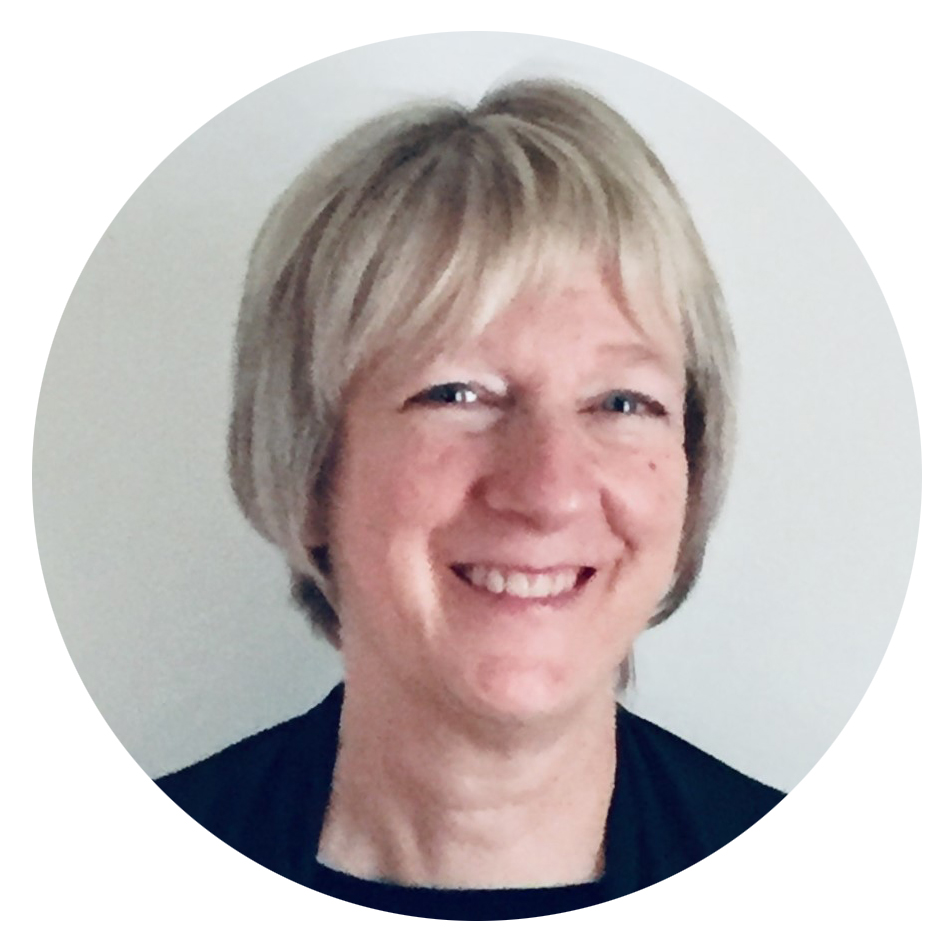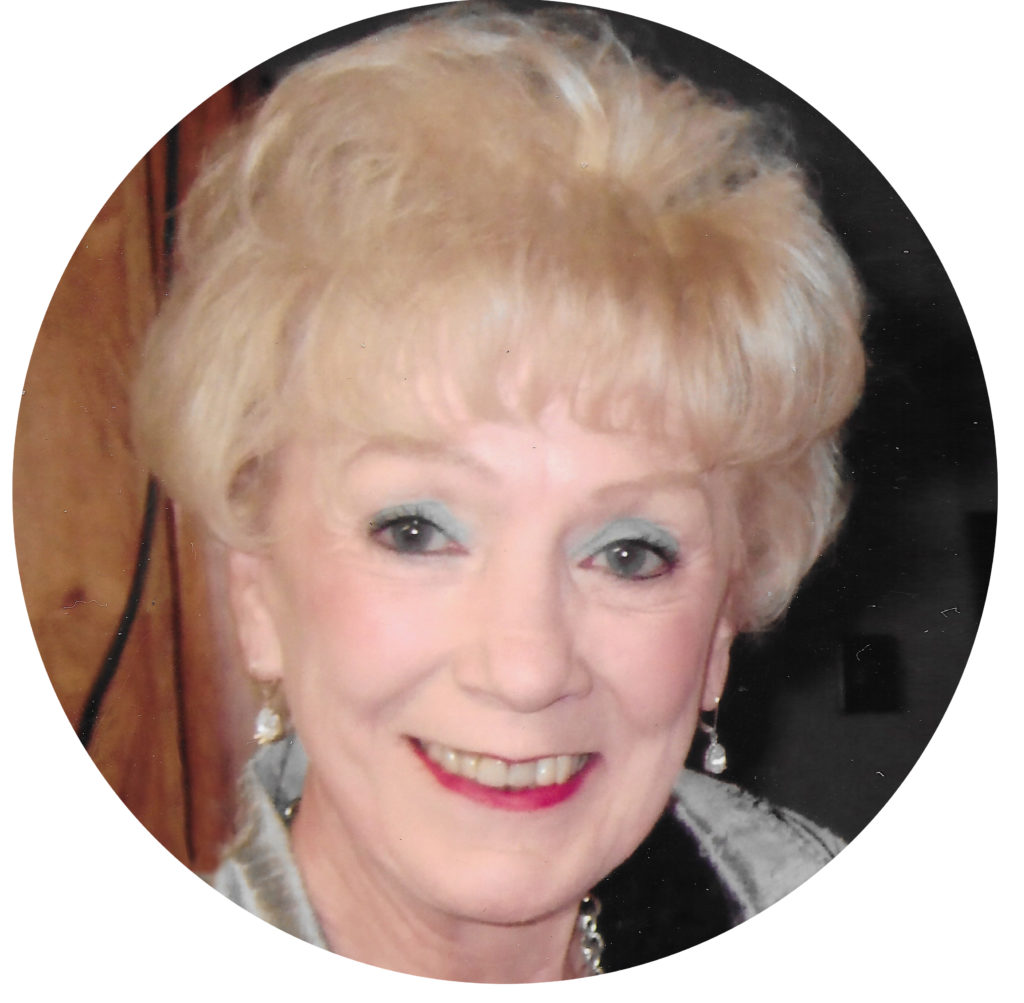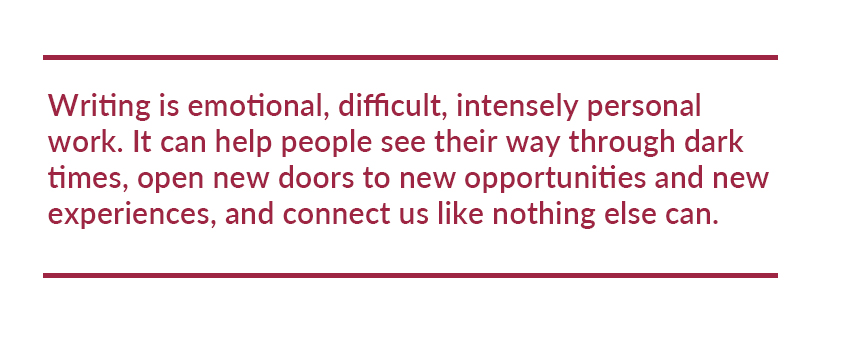
One of the many programs administered by UW-Madison’s Writing Center is called Madison Writing Assistance (MWA). MWA could be described in many different ways—a local literacy program, the Writing Center’s public outreach branch, a tutoring service. Co-founded by former Writing Center Director Brad Hughes in 1999 and offering writing tutoring out of Madison’s Goodman South Library branch, it has grown significantly since that time. Currently, MWA offers free writing instruction at seven libraries and community centers around the city.
Signing on as an MWA instructor, I quickly realized it was like no other teaching job I’d ever had. Supporting writers in a myriad of different genres—a historical-fiction fantasy novel, a collection of poems inspired by philosophy, a narrative of family trauma, a book of Biblical scholarship, not to mention job application materials for all kinds of positions, from a kitchen manager job to a biology research fellowship—was overwhelming at first, and then exhilarating. In this unique new teaching role, I felt my capacity as a teacher stretched to its limit.
MWA is unique, too, in the way it connects community members with UW graduate student instructors. When writers sign up for a session with one of the program’s instructors, it means 45 minutes or an hour sitting down with a graduate student with extensive experience both as a teacher and writer. I know of no other service that connects graduate-level writing instructors with the general public, especially not for free—the program is funded by grants from multiple charitable organizations, namely the Evjue foundation, the UW Madison Anonymous Fund, and Altrusa International of Madison. It is through the continued support of these amazing organizations that we can continue to provide our services every semester.
In Fall 2019, I was honored to accept the position of Assistant Director of MWA, and one of my first goals was to get to know the program more deeply. I was especially interested to know more about who uses these services. Gathering the names of three MWA veterans—people who had used MWA’s services for multiple consecutive semesters, maybe even multiple years—I began to ask, who were these people who clearly thought our services were valuable enough to merit many return visits? How had MWA touched their lives? What could I learn from them about literacy, about writing, and about life?
With these questions, I set out to contact three of these writers. I expected some reluctance on their part, but to my delight, all three responded with resounding positivity. In the paragraphs below, I’ll describe my conversations and impressions with these three remarkable individuals and how their lives have intersected with MWA. I hope that with my descriptions here, I can do these amazing writers justice, and show that MWA’s impact has been huge, throughout these writers’ lives.
Cheryl

Setting out on this project, I meet with Cheryl first, at a packed coffee shop in downtown Madison. Over the sound of the espresso machine, Cheryl tells me about how she first got in touch with MWA. “So I needed a resume,” she begins, and laughs. “And that was where [MWA] came into play, because I just hadn’t done a resume in a long, long, long time, and so not only had the information that I wanted to put on a resume changed a lot, [but also] the way to do a resume had changed a lot too, and so I was really excited to be able to work with this program.” She recalls having excellent experiences with quite a few different instructors, but one in particular stands out in her memory—now MWA’s Interim Director, Angela Zito. “She was really awesome,” Cheryl says. “She was very good at listening to what it was … that I wanted to say, and then helping me come up with the right words to convey that.”
For Cheryl, a physical therapist, MWA provided a way to maintain both geographical and professional flexibility. In order to support an ill family member, she sought out what she calls “travel jobs”: temporary out-of-state work in which she could, for example, fill in for someone on maternity leave, giving her the chance to maintain Madison as her home base but still have funds and flexibility to support her family. Once she had identified a job that worked for her travel timeline and family support obligations, she would work with MWA’s instructors to plan her resume or cover letter.
She’s used MWA’s services for other things, too. When a family member passed, she came to MWA to write that person’s obituary. When she wanted to make a career move, becoming interested in the growing field of veterinary physical therapy, MWA instructors helped her draft emails contacting experts in that field to make inquiries, learn about the field, and ask about opportunities for job shadowing.
I ask her what kept her coming back to MWA over time. “I can get stuck on things,” she says, “so if there’s a paragraph that I don’t like, then I can probably spend way too long obsessing over—okay, I don’t really like the way this sounds, I’m not sure why I don’t like the way this sounds, maybe it’s this word here, how this sentence is structured…. I think with [MWA], most of the people have a really nice sense of how much feedback to give, and how much to let this be my own creation, which I think is a gift.” By helping her craft her job materials, MWA helped Cheryl accomplish her goals, move her life in the directions of her choosing, and structure a life in a way that balanced her professional and familial responsibilities.
Colleen

Colleen got started with MWA under very different circumstances from Cheryl. She graciously invites me to interview her in her beautiful home, where, under smiling photos of her family members, she describes her work with MWA. Dealing with some serious health issues, she came to MWA to write her medical history. With that accomplished, she was at loose ends. “I got so attached to those writers, and their reception of me, and I said, ‘What am I gonna do now? I’m gonna miss you so much.’ And they said, ‘Well why don’t you start writing “growing up in Wisconsin”?’ Oh, okay, if you’ll stick with me, I’ll try.” After two years of this, working with MWA instructors, Cheryl had written her life story, eventually publishing it under the title Breaking the Silence: Secrets of a Lifetime.
If you pick up the hefty tome that is Colleen’s book, you’ll immediately get a feeling for the commitment, time, and passion she poured into this work. Talking to her, I’m floored by her sheer guts in telling this story, and amazed by her life. “I had a lot of things to write in that book,” she says. She talks about getting divorced in a time when divorce was frowned upon; about the struggle of raising her kids; about losing twins who were born prematurely and the terrible depression she experienced afterwards; about going to therapy for the first time and the profound transformation it had on her life.
One of the most significant parts of her story, for her, was helping her son, who went through a bad car accident and then experienced severe mental health problems. To prevent him from being placed in a halfway house, where she was sure he wouldn’t receive adequate treatment, Colleen took him in and supported him until he recovered. (He went on to become a professional stainless steel welder, a profession he has held for the past thirty years.) She also worked extensively around Wisconsin as a social worker, and she talks vividly about the many cases she has participated in, supporting other people in mental and emotional distress. The goal of the book, according to the back blurb, is sharing “…my recollection of the neglect which all sorts of people who experience forms of mental illness face and the work I’ve done to combat this horrifically bad treatment, for myself, my family, and for clients I worked with at a state agency.”
Colleen’s descriptions of working with MWA speaks so much to the warmth and dedication of the program’s instructors. She always felt welcomed during MWA sessions: “They lit up the minute I walked in the room. ‘Hey, Colleen’s here!’ You know? ‘What are you going to write about today?’” When I asked her if there was a relationship between therapy and writing, she said yes. “It was their response [her therapists and MWA instructors] to me in both situations that kept me coming back. Without that, I would’ve given up.” She tells me how she initially built up her confidence in therapy, processing and expressing her life story, and MWA became an extension of that personal growth and coming-to-terms.
When I asked her why she wrote this book, she describes how it “got to be very important to me, and maybe in the back of my mind it was for my family too. You know—that you can survive a lot of obstacles and just writing about the loss of those twins, and the counseling that I had to have, and how close you can come to thinking you’re worthless and have nothing to live for, nothing to give to anyone, and how that feels. And I think those are important for other people maybe to read to know.”
Ultimately, too, she says, she hopes her future grandkids will read the book. “Yeah, that’s why I’m ‘breaking the silence.’ Grandma’s telling it all. Uh oh,” she says, and laughs.
Elena
Elena’s writing shows yet another angle of MWA’s work with the community. Her writing is perhaps the most difficult to pin down, because it comes in so many different forms. She’s written a series of “vignettes based on cocktail aprons,” Aprons and Voices from the Heartland. She has a blog, Polar Bear Witness, which boisterously advocates for climate protection from the perspective of, you guessed it, a polar bear. Recently, at the suggestion of MWA instructor Weishun, she began an Instagram account, which is also a platform from which she argues for climate awareness. Her Instagram posts touch on all kinds of topics, from local artists’ work to personal stories to politics.

She reads some of her work aloud to me, as we sit in one of Madison Public Library’s private study rooms, and her writing strikes me as dryly witty, keenly observative, and maybe even poetic. This comes across strongly in an entry she wrote for her travel blog:
The three illuminated digital screens at the front of our plane’s cabin show our flight path. For hours, the small white plane with a red nose followed a narrow white line of its trajectory over a deep blue background, the Atlantic. The mighty Atlantic, once fearfully traversed by sailboats, only a few years ago, and now crisscrossed by dozens, perhaps hundreds of jet-propelled airplanes, day and night, the once-mighty Atlantic now referred to by us almighty jet-setters as ‘the pond.’ … I notice that several of my fellow cabin passengers have lifted up those circular shade panels of our plane’s window portals. From my seat in the middle aisle, I can see the white light of Spain, even though my central time watch face tells me it’s one-thirty pm. In the Anthropocene that I and my fellow passengers find ourselves, we are above it all, having defied both gravity and time.
In another project, a gratitude journal, MWA instructor Ashley suggested that Elena add subtitles to different sections as a way to foreground themes that Ashley saw emerging. There are categories like “The little things” or “Thinking about family.” Ashley pointed out that Elena seems to reflect a lot on institutions in her life, such as Glass Nickel Pizza, for which Elena (like many Madisonians) is grateful. Elena precisely remembers which MWA instructor gave her which advice—that Fatima complemented her on this quality, or Hadis suggested this addition, and Jennifer had this idea. She lavishes praise on them, too. “Weishun was brilliant, and that was a gift to work with her.” “Ashley is a treasure too with her theatre [experience] and her perspective.” “So you get a sense of the value that I’ve gotten out of out of the listening that I have from the coaches [MWA instructors] that I’ve worked with.”
A few times as she reads to me, she reaches parts that seem to resonate with her especially deeply, and I can hear her voice catch with emotion. I realize how intensely these stories matters to her. Her writing isn’t just journaling—it’s a visceral connection to the past. There’s so much fascinating cognitive and compositional work that goes into Elena’s written life: organizing and cataloguing experiences, calling up significant moments from the past, and expressing all of these ideas in a wry and sophisticated voice. In her writing, I can see a profoundly creative person collecting her thoughts, drawing connections, playing with words, and flexing her creative muscles. She tells me she that her writing could be understood with the saying, “We don’t really know what we think unless we write it down.”
Living Writing
Throughout these compelling and often emotional interviews, I constantly tried to draw the threads together. How could I connect these three disparate lives and their different ways of living through writing? Each of them was certainly affected by their contact with MWA. Cheryl successfully navigated career and life changes through MWA’s support; Colleen produced an incredible work of memoir and healing; Elena used MWA to create platforms for her incisive wit and keen observations, not to mention for her environmental activism. What’s the connection?
It’s clear that MWA instructors have played a real role in each of their lives. I noticed that each of them had their own term for MWA instructors. Cheryl refers to them as “the writing people.” Colleen’s term for them is “those teachers” or “those writers.” Elena calls them “coaches.” All three of them speak fondly about their time working with MWA instructors, either with positive experiences or about the benefits brought in their lives. “It’s a relief!” Cheryl says, describing the moment when she sits down with an MWA instructor to work on a piece of writing. Having a consistent place to find support at a moment when they really needed it, I think, has been a hugely supportive and important piece for all three of them.

In my field, second language acquisition, and in literacy studies, in education, and I’m sure in many other fields, scholars have struggled to define what literacy is and what effect it has on people’s lives. It’s beyond my scope or my skill to try to answer that question here, but my ending point will be this. While you could never measure MWA’s impact in terms of dollars earned or profit in the traditional sense, I can’t over-exaggerate how important MWA seems after talking to these three writers. Writing is emotional, difficult, intensely personal work. It can help people see their way through dark times, open new doors to new opportunities and new experiences, and connect us like nothing else can. Whether it’s a resume or a book or an Instagram post, writing—not to mention the resources that help us to write—is beyond valuable.
Tim Cavnar is Assistant Director of the Madison Writing Assistance program and is earning his PhD in Second Language Acquisition at UW-Madison.


This has really motivated me and I’m sure all the people out there! Looking forward to some more content from you like this. Cheers!
Thank you, this is really helpful!
I now have a clear idea of what MWA is. What a great job you did tying the three writers together!
Hi Tim! We don’t know each other, and I know that this post was published over a year ago, but I feel compelled to comment. I was an MWA instructor several years back and just today was thinking about Colleen, what had become of her, and whether she’d ever had a chance to publish her memoir. I suspected an Another Word post might have some answers, and I’m so moved to be virtually reunited with her (and thrilled to purchase a copy of her book). You talk about how MWA touched these writers’ lives, but they’ve also deeply touched mine. Thanks for sharing this.
Leigh Elion
Director of the Writing Center
Oxford College, Emory University
Writing is one of my biggest passions and I am always happy to learn more about other talented writers. Thank you!
Thanks so much Tim for sharing this success stories! I tell you that as a kid I never like to write, but after taking journalism in high school, it sort of became my thing and now I love it. This article was very inspiring and just what I needed to keep going through this pandemic!
Thank you, this is really wonderfull!!
Thank you, this is really wonderfull!!
Thank you, this is really wonderfull!!
Thank you, this is really wonderfull!!
Thank you, this is really helpful! Thanks again
Very detailed and informative research! That was quite enjoyable reading. Please keep up the good work!